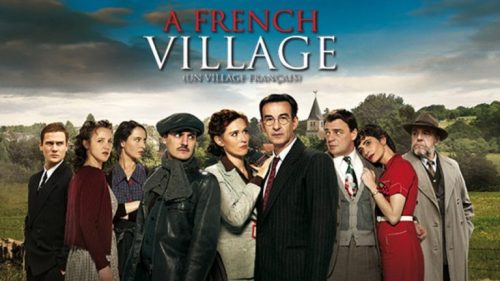
Month: September 2019
Summer Rerun– Video Review: A French Village

This series, set in the (fictional) French town of Villeneuve during the years of the German occupation and afterwards, is simply outstanding – one of the best television series I have ever seen. The program ran from 2009-2017 on French TV, and all the seasons are now available in the US, with subtitles.
Daniel Larcher is a physician who also serves as deputy mayor, a largely honorary position. When the regular mayor disappears after the German invasion, Daniel finds himself mayor for real. His wife Hortense, a selfish and emotionally-shallow woman, is the opposite of helpful to Daniel in his efforts to protect the people of Villaneuve from the worst effects of the occupation while still carrying on his medical practice. Daniel’s immediate superior in his role as mayor is Deputy Prefect Servier, a bureaucrat mainly concerned about his career and about ensuring that everything is done according to proper legal form.
The program is ‘about’ the intersection of ultimate things…the darkest evil, the most stellar heroism….with the ‘dailyness’ of ordinary life, and about the human dilemmas that exist at this intersection. Should Daniel have taken the job of mayor in the first place?…When is it allowable to collaborate with evil, to at least some degree, in the hope of minimizing the damage? Which people will go along, which will resist, which will take advantage? When is violent resistance…for example, the killing by the emerging Resistance of a more or less random German officer…justified, when it will lead to violent retaliation such as the taking and execution of hostages?
Arthur Koestler has written about ‘the tragic and the trivial planes’ of life. As explained by his friend, the writer and fighter pilot Richard Hillary:
“K has a theory for this. He believes there are two planes of existence which he calls vie tragique and vie triviale. Usually we move on the trivial plane, but occasionally in moments of elation or danger, we find ourselves transferred to the plane of the vie tragique, with its non-commonsense, cosmic perspective. When we are on the trivial plane, the realities of the other appear as nonsense–as overstrung nerves and so on. When we live on the tragic plane, the realities of the other are shallow, frivolous, frivolous, trifling. But in exceptional circumstances, for instance if someone has to live through a long stretch of time in physical danger, one is placed, as it were, on the intersection line of the two planes; a curious situation which is a kind of tightrope-walking on one’s nerves…I think he is right.”
In this series, the Tragic and the Trivial planes co-exist…day-to-day life intermingles with world-historical events. And the smallness of the stage…the confinement of the action to a single small village….works well dramatically, for the same reason that (as I have argued previously) stories set on shipboard can be very effective.
Talent Vs. Practice
Contrary to the very American attitude that hard work is more important than talent, I come from the school that says hard work only begins to matter if you have talent to start with. As some endeavors take only a minimum of talent to accomplish, hard work is more of a determinant than talent there. But for many desirable accomplishments, no amount of hard work means anything unless there is significant talent to begin with.
But first, stories. I read many years ago about a man checking into his hotel room, noticing a man with a cello checking into the room next to him. He recognized the man as a famous concert performer. It wasn’t Yo-Yo Ma, but it was a figure like that. (We should be immediately alert to the notion that the story is probably not true. As with spotting hoaxes, things that look too good to be true usually are too good to be true.) The man was pleased, wondering if he would get to hear the great musician practice, and get a free concert. Music did indeed begin to be heard on the other side of the wall in about a half-hour. The cellist was playing scales. He played nothing but scales for an hour, took a fifteen-minute break, and then played scales for another hour. He heard the door open and close, and heading downstairs himself, saw the man taking an early dinner in the hotel restaurant. The musician left without his cello after dinner, played a scheduled concert, and when he returned – played scales for another hour.
Bill Whitman, a college bandmate who now plays blues piano on Beale St in Memphis for a living gets frustrated with people who come up and marvel at his natural talent. No matter how much he tells them that no, he practices very hard and has for years, they seem determined to believe that it must be talent and knack, not hard work, that has brought him to this level of skill. It irks him.
Athletes run into the same attitude. LeBron James works very, very hard at his craft. Tiger Woods put in hours of directed practice even as a child, coached by his father. And Joe DiMaggio, who Zachriel linked to and used as an example, did indeed spend hours practicing his batting. My stepfamily had many athletes – DII All-Americans and such like – and they not only played sports year-round and constantly, but would hit years where they wanted to take their game to another level and would put in the hours lifting weights or attending expensive clinics. They worked hard, and sometimes I got to see it.
Loneliness
I always feel sorry whenever I hear about anyone who is lonely. We have all experienced it, sometimes for extended periods. Reading that an entire generation or two might be more likely to feel lonely is discouraging.
I am always suspicious of statistics about entire age-groups. Not only are the boundary lines fuzzy, but they always involve trends and percentages, not either-ors. If Boomers check some box 40% of the time and it steadily lessens until Gen Z only checks it 25% of the time, that may be significant and worth looking at, but it means you shouldn’t be drawing a conclusion about any individual you are meeting fresh, nor even about the generation as a whole. Some key word in the question might have a different meaning. The difference may reflect their current age more than their generation. That is, those same Gen Z’ers might also check that box 40% of the time forty years from now.
The Way Things Were and Are
Separately, the Daughter Unit and I watched a series on Netflix (don’t hate on us, there’s still some good stuff there, and I don’t want to bail out until we’ve milked it dry) about the last Czars of Russia – specifically the series which mixed fairly serious commentary about the Russian Revolution with interestingly high-end reenactments of events in the life of the last czar and his family. (Seriously, though – I doubt very much that Nicky and Alix made mad hot whoopee on a fur coat underneath his official czarsorial desk, while the household staff made a heroic effort to ignore the amatory noises coming from behind closed doors. Just my .02. She was a Victorian, for Ghod’s sake. Really; Queen V.’s granddaughter. Who privately thought that Dear Alix wasn’t in the least up to the challenge of being Czarina of all the Russians; Alix may have waxed poetically amatory about her affection and trust in Father Grigory Rasputin, but to do the nasty on the floor, in daylight? Even with your wedded husband? Just nope. Nope.)
I will accept that the orgiastic interludes involving Rasputin were likely and wholly believable. And that Nicky and Alix loved each other, that their four daughters and son with medical issues all loved each other with a passionate devotion that lasts through this world and the next. The last shattering sequences in the Ipatiav House rings true. That was the way it was, and that was how it ended. (I reviewed a book on this, here.)
I was meditating on all of this – with a consideration towards royalty; the old-fashioned kind, and the new-mint variety.